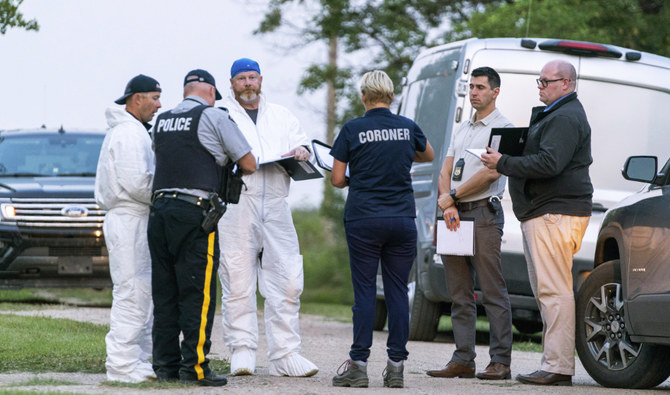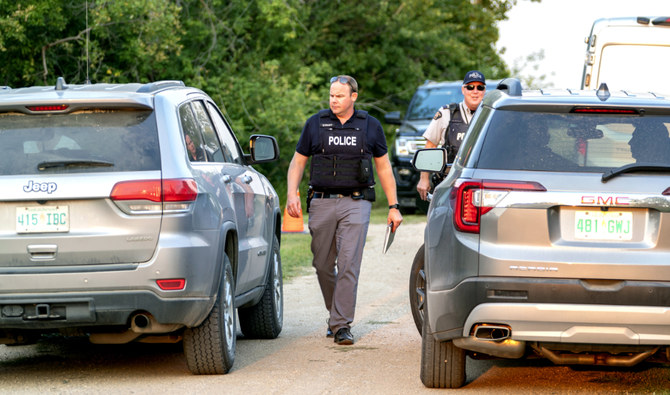WELDON, Saskatchewan: Canadian police said Monday one of the suspects in the killing of 10 people in a series of stabbings has been found dead, and his injuries are not self inflicted. They said his brother, also a suspect, may be injured and remains on the run.
Regina Police Chief Evan Bray said Damien Sanderson, 31, has been found dead and that they believe Myles Sanderson, 30, is in Regina, Saskatchewan.
Canadian police searched Monday for two men suspected of killing 10 people in a series of stabbings in an Indigenous community and a nearby town, as a massive manhunt for the perpetrators of one of the deadliest attacks in the nation’s history stretched into its second day.
Authorities have said some of the victims were targeted and others appeared to have been chosen at random on the James Smith Cree Nation and in the town of Weldon in Saskatchewan province. They have given no motive for the crimes, which also left 18 people injured — but a senior Indigenous leader suggested drugs were somehow involved.
Police believe the suspects were last spotted around midday on Sunday in the provincial capital of Regina, about 335 kilometers (210 miles) south of where the stabbings happened. Police believe they are still in the city, but didn’t say why they think that. Authorities issued alerts in Canada’s three vast prairie provinces — which also include Manitoba and Alberta — and contacted US border officials.
With the suspects still at large, fear gripped communities in the rural, working class area of Saskatchewan surrounded by farmland that were terrorized by the crimes. One witness who said he lost family members described seeing people with bloody wounds scattered throughout the Indigenous reserve.
“No one in this town is ever going to sleep again. They’re going to be terrified to open their door,” said Ruby Works, who also lost someone close to her and is a resident of Weldon, which has a population of about 200 and is home to many retirees.
As the Labor Day holiday weekend drew to a close Monday, police urged Saskatchewan residents who were returning from trips away to look for suspicious activity around their homes before entering.
Arrest warrants have been issued for Damien Sanderson, 31, and Myles Sanderson, 30, and both men face at least one count each of murder and attempted murder. More charges are expected.
Police have given few details about the men. Last May, Saskatchewan Crime Stoppers issued a wanted list that included Myles Sanderson, writing that he was “unlawfully at large.”
While the manhunt continued, police also issued a provincewide alert for suspects in a shooting on the Witchekan Lake First Nation. Officials said the shooting was not believed to be connected to the stabbings, but such alerts are unusual and the fact that a second occurred while authorities were already scouring the Saskatchewan for the stabbing suspects was notable.
The stabbing attack was among the deadliest mass killings in Canada, where such crimes are less common than in the United States. The deadliest gun rampage in Canadian history happened in 2020, when a man disguised as a police officer shot people in their homes and set fires across the province of Nova Scotia, killing 22 people. In 2019, a man used a van to kill 10 pedestrians in Toronto.
Deadly mass stabbings are rarer than mass shootings, but have happened around the world. In 2014, 29 people were slashed and stabbed to death at a train station in China’s southwestern city of Kunming. In 2016, a mass stabbing at a facility for the mentally disabled in Sagamihara, Japan, left 19 people dead. A year later, three men killed eight people in a vehicle and stabbing attack at London Bridge.
“It is horrific what has occurred in our province,” said Rhonda Blackmore, assistant commissioner of the Royal Canadian Mounted Police in Saskatchewan.
Police got their first call about a stabbing at 5:40 a.m. on Sunday, and within minutes heard about several more. In all, dead or wounded people were found at 13 different locations on the sparsely populated reserve and in the town, Blackmore said. James Smith Cree Nation is about 30 kilometers (20 miles) from Weldon.
She couldn’t provide a motive, but the chief of the Federation of Sovereign Indigenous Nations suggested the stabbings could be drug-related.
“This is the destruction we face when harmful illegal drugs invade our communities, and we demand all authorities to take direction from the chiefs and councils and their membership to create safer and healthier communities for our people,” said Chief Bobby Cameron.
As the manhunt stretched on, Regina Police Chief Evan Bray urged anyone with information to come forward.
Bray said they got a credible tip they were in Regina and he told the Canadian Broadcasting Corporation that following a “very aggressive investigation” police believe they are still in the city.
The elected leaders of the three communities that make up the James Smith Cree Nation declared a local state of emergency.
Chakastaypasin Chief Calvin Sanderson — who apparently is not related to the suspects — said everyone has been affected by the tragic events.
“They were our relatives, friends,” Sanderson said of the victims. “It’s pretty horrific.”
Among the 10 killed was Lana Head, who is the former partner of Michael Brett Burns and the mother of their two daughters.
“It’s sick how jail time, drugs and alcohol can destroy many lives,” Burns told the Aboriginal Peoples Television Network. “I’m hurt for all this loss.”
Burns later posted on Facebook that there were dead and wounded people everywhere on the reserve, making it look like “a war zone.”
“The look in their eyes couldn’t express the pain and suffering for all those who were assaulted,” he posted.
Doreen Lees, an 89-year grandmother from Weldon, said she and her daughter thought they saw one of the suspects when a car came barreling down her street early Sunday as her daughter was having coffee on her deck. Lees said a man approached them and said he was hurt and needed help.
But Lees said the man took off after her daughter said she would call for help.
“He wouldn’t show his face. He had a big jacket over his face. We asked his name and he kind of mumbled his name twice and we still couldn’t get it,” she said. “He said his face was injured so bad he couldn’t show it.”
She said she began to follow him because she was concerned about him, but her daughter told her to come back to the house.
Weldon residents have identified one of the dead as Wes Petterson, a retired widower who made he coffee every morning at the senior center. He loved gardening, picking berries, canning, and making jam and cakes, recalled William Works, 47, and his mother, Sharon Works, 64.
“He would give you the shirt off his back if he could,” William Works said, describing his neighbor as a “gentle old fellow” and “community first.”
Sharon Works was baffled: “I don’t understand why they would target someone like him anyway, because he was just a poor, helpless little man, 100 pounds soaking wet. And he could hardly breathe because he had asthma and emphysema and everybody cared about him because that’s the way he was. He cared about everybody else. And they cared about him.”
The pair said there is hardly any crime in the rural town, except an occasional speeding ticket. They always left the door unlocked until the night of the slayings.
“Not even when I go to town, I don’t lock my door,” Sharon Works said. “But now I have to find my key to my house. I never used to lock the doors and nobody around here until this happened.”
Prime Minister Justin Trudeau said the flag above Canada’s parliament building in Ottawa would be flown at half-staff to honor the victims.
“Sadly, over these past years, tragedies like these have become all too common place. Saskatchewanians and Canadians will do what we always do in times of difficulty and anguish, we will be there for each other,” Trudeau said.


























